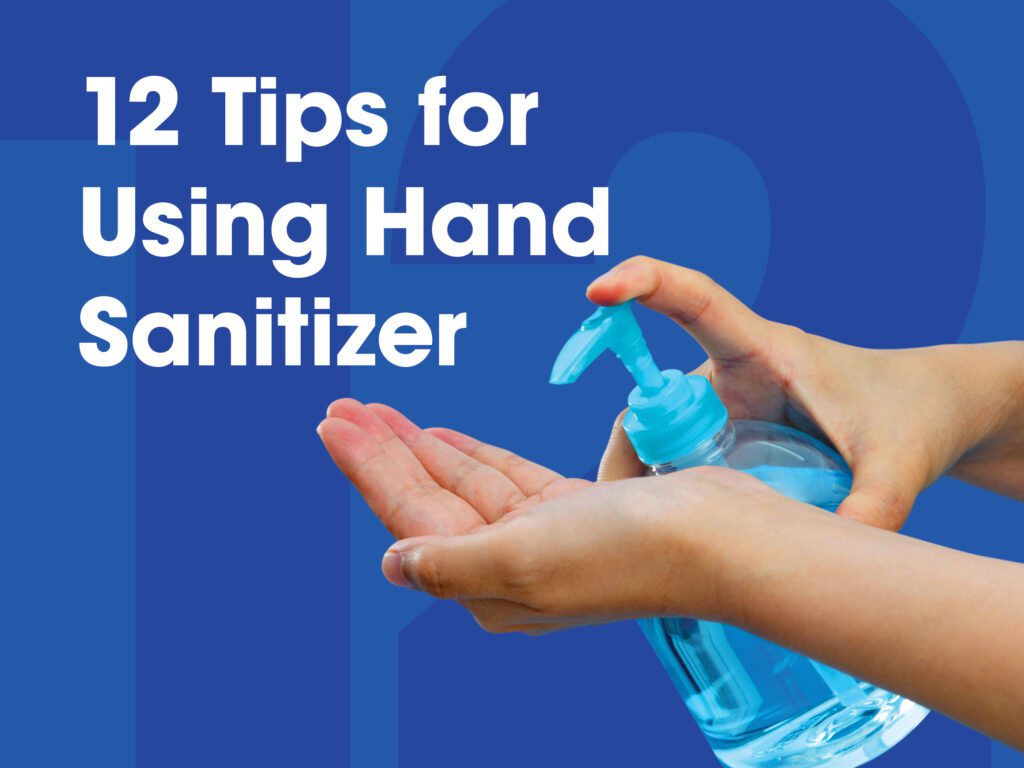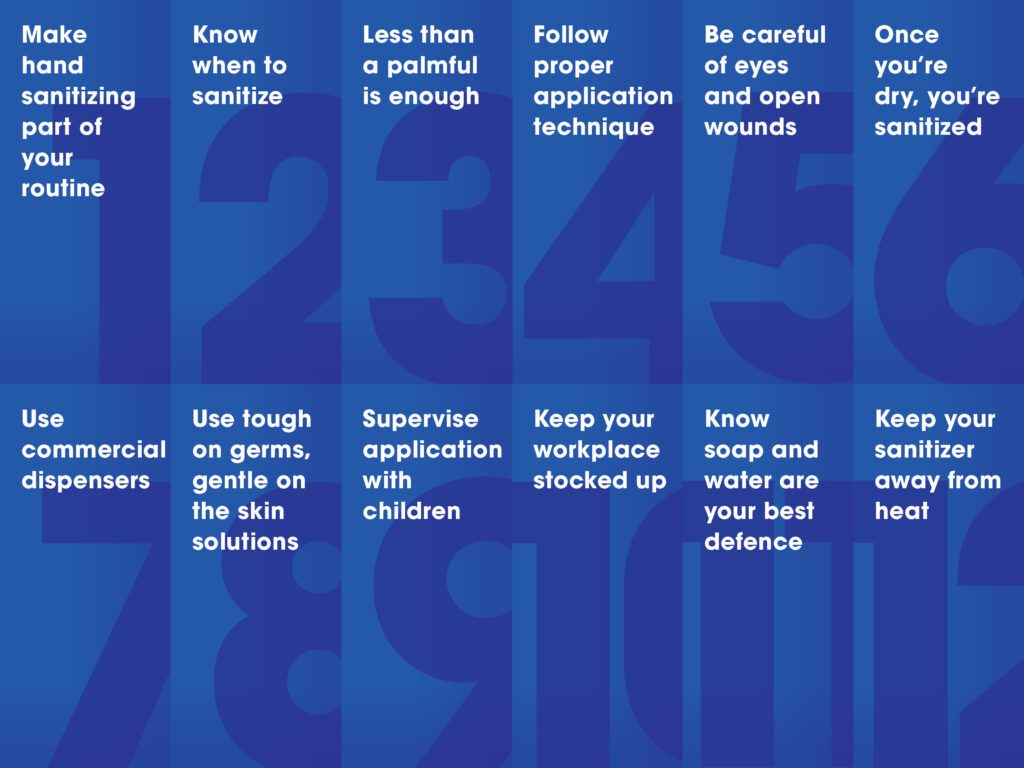Table of Contents
Last Updated on February 14, 2023
A complete guide to commercial hand sanitizer that will cover everything you need to know about how to effectively use hand sanitizer in your workplace.
Germs are tiny organisms that survive in the air, water, food, surfaces, plants, on our skin, and in our bodies; in fact each day most people can encounter roughly 60,000 germs.
Daily activities introduce us to more germs. This is something we can’t control and can potentially lead to the transmission of illness and infection.
However, cleaning your hands is a key preventative measure that can reduce the spread of infection and help you to stay healthy and safe.
Commercial hand sanitizer is often a more accessible and convenient hand cleaning solution in comparison to water and soap hand washing options. In your workplace, your employees and the public may not be able to regularly visit a bathroom to wash their hands.
Commercial hand sanitizer is a viable hand hygiene solution in many situations where soap and water are not.
Placing commercial hand sanitizer strategically around your workplace can help to kill microorganisms and reduce bacterial counts on hands which in turn limits cross-contamination.
Commercial hand sanitizing stations, bottles, and dispensers can be placed around any busy commercial environment to promote consistent hand washing throughout the day.
This way, as a business, you can manage and encourage good hand hygiene, inevitably promoting a safer and more hygienic environment for all who come and go.
In this guide, we go into detail about the importance of commercial hand sanitizer, its proper use, whether it can expire, and the various options it comes in.
What is Commercial Hand Sanitizer?
Commercial hand sanitizer is a liquid, gel, or foam solution that is used to kill viruses, bacteria, or microorganisms on the hands within high-traffic workplace environments such as offices, retail stores, restaurants, hotels, and gyms for example.
It’s often used as an alternative to the traditionally preferred method of hand washing using soap and water, where water basins and soap facilities aren’t readily available, i.e., outside the washroom environment.
Why Is Using Commercial Hand Sanitizer So Important?
Commercial hand sanitizer within a workplace is essential to maintain high levels of health and hygiene. It reduces the rate of infection transmission of highly infectious diseases and can reassure customers and staff that you take hygiene seriously.
Employees with access to proper hand sanitizing facilities will benefit from better health, hygiene, and overall wellness. In fact, a study published in the Journal of Occupational and Environmental Medicine reported that when comprehensive workplace hand hygiene programs are used, hygiene-preventable healthcare claims are significantly reduced (by over 20%) and absenteeism is also positively impacted.
This study and others indicate that proving good hand hygiene programs such as commercial hand sanitizers can benefit any workplace environment and help drive productivity and business success.
Another study found daily use of instant hand sanitizer was associated with significantly lower rates of illness-related absenteeism in schools. Compared to the hand washing-only control group, students using hand sanitizer were found to have 41.9% fewer illness-related absence days, likewise, absence incidences decreased by 31.7%. Hand sanitizer and proper hand hygiene in school bathrooms is one of the most effective ways to prevent RSV, flu and COVID-19 in kids.
This goes to show the importance of using commercial hand sanitizer within every commercial environment, whether it be in a school, office, shopping mall or health facility, to avoid the risk of infection transmission.
Failing to supply viable hand sanitizing solutions within your commercial facilities can paint a negative image of your brand or business as this shows little care or consideration is going into those who use your facilities daily.
It also exposes the risk of illness which can have long-term negative effects on not only the well-being of employees and visitors but also the success of your business. Providing effective hand sanitizing solutions shows you’re willing to create a considerate environment for those who come and go and helps to build a sense of trust.
8 Most Important Things to Know About Commercial Hand Sanitizer
Commercial hand sanitizers have a range of benefits that work together to improve a range of factors within your facility.
Here are 8 things you need to know about commercial hand sanitizer to understand its full potential when supplied in your work environment and used properly.
Plus, we share four myths about commercial hand sanitizer.
#1 What Are the Different Formulations of Hand Sanitizer for Commercial Use?
From foam solutions to gel-based and liquid commercial hand sanitizers, there is a vast range of formulations to choose from. Deciding on the best hand sanitizer solution for your organization boils down to preference as they all work well to ensure excellent hand hygiene.
However, you should ensure that the right dispenser is chosen. This is because certain formulations such as foam require a dispenser that has a special foaming chamber to work effectively.
Scientists will say all forms are equally as effective as long as the hands are fully covered and exploited to remove all possible germs and viruses.
Foam Hand Sanitizers
Foam hand sanitizers are known for their effectiveness in clinging to hands during the application of the product, as the solution doesn’t easily slide off as you may find with gel sanitizers.
In addition, foam hand sanitizer solutions are generally easier to spread around your hands, enabling more surface area on the hands to be protected.
In fact, a study revealed foam sanitizer can wipe out more than twice as much bacteria as a traditional hand gel supported by a second study that found hand foam continues to fight germs for up to 3 hours after administration.
Gel-Based Hand Sanitizers
There’s often a debate about whether a foam or gel-based hand sanitizer is more effective at reducing bacteria on the hands and, generally speaking, studies find foam hand sanitizers to be more successful than hand gels.
Nevertheless, gel-based hand sanitizers are still beneficial and can significantly help to reduce illness and therefore shouldn’t be disregarded as an effective hand sanitizing solution.
In fact, some find hand gel easier to spread around the hands and around the fingernails better as the gel flows into the cuticles. It’s best to see what your employees prefer to use as sticking with a solution they like will mean they’ll use it more often.
Liquid Hand Sanitizers
Liquid hand sanitizers have a range of benefits including the ability to be dispensed in spray bottles, and used on frequently touched surface areas, which cannot be done with foam or gel sanitizers.
Studies also suggest liquid disinfectant hand sanitizer can be faster acting; where they can be effective in an average of 15 seconds whereas gel hand sanitizer was noted to require up to 30 seconds of proper application to fully eliminate germs on the hands. Liquid sanitizers also lack the slimy feel gel sanitizers can have and tend to dry faster leaving less residue on surfaces after use.
Alcohol Free Hand Sanitizers
Alcohol-free hand sanitizers can be known as the weaker solution compared to alcohol-based sanitizers and, with the Covid-19 pandemic highlighting the importance of excellent hand hygiene, many immediately sway towards the stronger alcohol-based sanitizers.
However, the effectiveness of alcohol-free hand sanitizers is dependent on the brand and quality, with less toxicity, skin irritation, and risk of fire hazards. Certified alcohol-free hand rubs may not be a bad alternative, particularly in commercial environments such as schools where users will be a lot younger in age and with more sensitive skin.
#2 Is Alcohol or Alcohol-free Hand Sanitizer More Effective?
For optimal hand hygiene hand sanitizer containing alcohol content is said to be more effective by both the CDC and World Health Organisation.
It’s best to go for a hand sanitizing solution with at least 60% alcohol as alcohol content has been proven to kill over 99.9% of germs, although alcohol-free hand sanitizers still offer a range of benefits and shouldn’t be overlooked.
Hand sanitizer formulas like Purell, have been scientifically proven to eliminate 27 organisms in just 30 seconds.
For more information, read our guidelines on using alcohol vs non-alcohol hand sanitizer for better hand hygiene. In summary, choosing any trusted Health Canada approved hand sanitizer will ensure optimal levels of hygiene are kept within your facility to limit the risk of infection.
#3 What Ingredients Can be Found in Hand Sanitizer?
The active ingredient in leading hand sanitizers such as Purell hand sanitizer is 70% ethyl alcohol which kills 99.99% of germs that may cause illness.
Some hand sanitizers also contain aloe vera gel which helps to moisturize the skin at every use and balances the drying effects of alcohol while concurrently eliminating bacteria and germs from the surface of your hands.
#4 Does Hand Sanitizer Expire?
According to Healthline the industry standard for when hand sanitizer expires is 2 to 3 years. So, what happens when hand sanitizer expires?
When the percentage of active ingredients drops below 90% of the percentage stated on the label the hand sanitizer is ‘out-of-date’. While it’s not dangerous to use hand sanitizer after the expiration date, it may not be as effective and therefore it’s best to ensure you have a non-expired sanitizing solution to hand.
#5 Alternatives to Commercial Hand Sanitizer
Water and commercial soap dispensers should be your preferred method of hand hygiene with commercial hand sanitizers sitting close second for instances where water and soap aren’t available.
However, you can still ensure excellent hand hygiene standards with other alternatives such as antiseptic hands wipes, spray, or alcohol swabs that remove bacteria.
#6 How to Clean your Hands Properly with Hand Sanitizer?
Supplying hand sanitizer, such as with the Gojo hand sanitizer refill dispenser, plays half the role. It’s then up to users to apply the hand sanitizer correctly to limit the spread of illness between employees, visitors, and customers.
The easiest way to ensure this is achieved is by placing clear hand sanitizer posters around your facility, preferably near hand sanitizing stations, so people are encouraged to utilize the hand sanitizer provided in the correct way.
Download Citron’s free ‘How to Use Hand Sanitizer’ posters to help users clean their hands correctly.
We’ve also curated the top 12 tips from hygiene experts for correctly using hand sanitizer
Read more about each tip by clicking the image below:
#7 When to Use Hand Sanitizer?
Commercial hand sanitizer should be used after encountering contaminated surfaces or other people who are sick.
If water and soap aren’t available use sanitizer immediately after sneezing, coughing, or blowing your nose to avoid spreading germs. If your hands are visibly dirty or greasy, for example after being outside or cooking it’s important to wash your hands with soap and water.
#8 How to Encourage Hand Sanitizer Use?
Encouraging proper hand sanitizer use within the workplace is essential to prevent illness around the workplace. Ensuring you position hand sanitizer in the right, high-traffic locations in your business is essential in encouraging use. Displaying bold ‘Please Use Hand Sanitizer’ hygiene signs can also help too.
These can help you remind those who enter your facility to utilize the supplied hand sanitizer stations throughout the day, especially after touching heavily contaminated surfaces such as stair rails, work computer keyboards, mobile phones, desks, and after shaking other peoples’ hands.
4 Myths About Hand Sanitizer
There are many myths and opinions lingering about hand sanitizer.
Below are four of the most important hand sanitizer myths and their truths you need to know once and for all.
#1 Myth: hand sanitizer is the best way to protect you from germs.
While hand sanitizer is effective at removing harmful bacteria, certain germs it can’t kill. Hand sanitizer will not kill germs that cause norovirus, cryptosporidium, and clostridium difficile (bacteria that can infect the bowel and cause diarrhea).
#2 Myth: Healthcare workers should ONLY use hand sanitizer when soap and water aren’t available.
For healthcare workers, the World Health Organization suggests alcohol-based hand sanitizer as it can be quicker and more effective at removing certain germs from hand surfaces than soap and water.
However, for the general population soap and water are essential defenses at removing germs and should always be incorporated into hand hygiene routines when available.
#3 Myth: All hand sanitizers are the same.
This simply isn’t true. From alcohol-based hand sanitizers to alcohol-free hand sanitizers, foam sanitizing solutions to hand gel, there are plenty of different options which can have different levels of effectiveness.
Your favorable hand sanitizer should depend on what the people in your facility prefer to use and what’s most effective for them. If it’s FDA-approved, you can rest assured your hand sanitizer solution of choice will work at killing off germs.
#4 Myth: You only need a small pump of sanitizer for it to be effective.
Wrong. To wash your hands properly, you need to rub enough sanitizing solution into your hands for the full 20 second duration as recommended by CDC with the right technique. A small pump simply is not sufficient to clean your hands correctly.
Commercial Hand Sanitizer Use in the Workplace
Commercial hand sanitizer can help to avoid the mass spread of infection between employees, visitors, and customers and can ensure you provide a safe, healthy working environment to all who come and go.
To confirm employees in your workplace know exactly when, where, and how to use the hand sanitizer provided, adequate education on the topic is paramount.
Should My Business Supply Hand Sanitizer or Soap?
It’s best practice for your business to supply both hand sanitizer and soap solutions as they both work alongside each other to promote a safer, healthier workforce.
Where soap and water solutions aren’t available, hand sanitizer stations are perfectly adequate and can be more flexible in terms of their location.
Therefore, to successfully encourage excellent hand hygiene both soap and sanitizing solutions are necessary.
Hand Sanitizer Locations in the Workplace
It’s imperative that your business puts hygiene first by providing suitable hand sanitizing solutions in high-traffic spaces where cross-contamination is likely, such as stairwells, meeting rooms, near office desks, outside washrooms, kitchen spaces, outside elevators and entrances and exits.
Putting an immediate stop to the spread of infection when the exposure is high will help control the rate of illness within the workplace.
Choosing the Best Commercial Hand Sanitizer for Your Business
Every business will have different needs and will require different levels of hygiene, therefore, choosing the right-hand sanitizer for your business is important.
Gyms
After touching gym equipment during a session, your members will want to feel confident in the fact they have suitable hygiene solutions available to wipe down their equipment and clean their hands.
Choosing several alcohol-based hand sanitizer stations that can be placed around the gym floor will remind members to use the sanitizer and maintain good standards of hygiene when working out. Consider also supplying surface disinfecting wipes to wipe down the equipment too.
Healthcare Facilities
Healthcare facilities are extremely vulnerable to infection spread and as a result need to ensure the highest levels of hygiene with proper hand hygiene solutions, such as hand sanitizer stands.
Patients, healthcare workers, and visitors should always have easy access to hand sanitizer to avoid cross-contamination between wards, patients, and the outside world.
Restaurants
Food safety is vital for good hygiene levels and supplying hand sanitizing stations ensures this. And while there may be some guests or staff who may not be able to use alcohol-based hand sanitizer, restaurants should try airing caution and, especially with the pandemic, where possible supply alcohol hand sanitizer that has proven to be the most effective in stopping the spread.
Schools
Children are constantly encountering harmful bacteria after being outdoors, with friends, in the classroom or on computers. It’s difficult to control infection spread in schools as kids often fail to care as much about their hygiene and lack basic principles.
However, providing hand sanitizer stands all around your school including outside classrooms, in hallways, outside the lunch hall, and near washrooms will remind students to practice proper hand hygiene limiting the spread of illness across staff and pupils.
Hand sanitizer is one of the best ways to prevent children’s cough and support kids’ health in the classroom.
Read our blog on why hand hygiene is so important in schools.


Commercial Sizes of Hand Sanitizer: How to Choose the Right Quantity?
Depending on how heavily populated your facilities are, you may require a certain amount of commercial hand sanitizer to facilitate for all.
Hand sanitizer dispensers and bottles come in different sizes depending on footfall. A hygiene services company should be able to advise you on what you size you need to ensure you never run out.
For desks or offices, buying smaller hand sanitizer bottles for individuals may be preferable.
Should I Use Hand Sanitizer Dispensers?
Hand sanitizer dispensers can be effective in the workplace as they offer a scope of opportunity for employees and visitors alike to practice hand hygiene when needed.
In addition, the presence of dispensers can present a positive image and store hand sanitizer safely to reduce cross-contamination. They can also disperse just the right amount which in turn reduces waste making them highly cost-effective. They can either be wall mounted or displayed on stands which can be moved around as necessary if business requirements change.
Why not take a look at Citron Hygiene’s choice of commercial hand sanitizer stations and see which solution would work for your business?
Where Should a Commercial Workplace Safely Store Hand Sanitizer?
Hand sanitizer contains flammable ingredients which pose a risk of a fire hazard if stored incorrectly. For both ethanol and isopropyl alcohol-based solutions, storage temperatures should be below 70°F to avoid the solution igniting if exposed to an open flame. Storage areas should be tightly controlled and out of reach from children, for example in schools, to avoid injuries or harm.
How to Ensure Your Business Doesn’t Run Out of Commercial Hand Sanitizer
It’s important that businesses stay stocked up on hand sanitizer to avoid running out, however with such a demand for hand sanitizer, especially in commercial environments, it can be difficult to find a permanent lasting solution.
That’s why hand sanitizer on service can be the answer for every business to ensure your hand sanitizer dispensers are being refilled at a frequency that best suits your business.
Learn more about how to never run out of hand sanitizer again.
Brands of Commercial Hand Sanitizer
With a number of hand sanitizer brands popping up since the COVID-19 Pandemic, it’s important to use a brand offering CDC-compliant solutions with scientifically proven high sanitizing quality such as Purell hand sanitizer which can be supplied and managed on a refill service through Citron Hygiene.
However, depending on your business’ budget and hygiene needs, you can opt for hygiene companies’ own brand hand sanitizing solutions which equally helps you commit to a safer community.


Expert Opinions on Hand Sanitizing
The CDC and other professional organizations suggest soap and water being the more effective method for removing certain kinds of germs, however, hand sanitizer is said to eliminate microbes well when used correctly which in turn prevents the risk of illness.
Always use hand sanitizer that’s Health Canada approved and complies with industry standards. FDA has seen a vast increase in hand sanitizer products that are labeled to contain ethanol (also known as ethyl alcohol) but have tested positive for methanol or 1-propanol contamination which can be toxic when absorbed through the skin or ingested and can be life-threatening when ingested. Therefore, when buying hand sanitizer for your business, always check FDA updates on hand sanitizers consumers should not use to determine whether your chosen hand sanitizers contain methanol or 1-propanol.
Learn More About Achieving Good Hand Hygiene in your Business
Good hand hygiene prevents the spread of highly infectious diseases and with suitable hand hygiene methods you can drastically lower and control the rate of infection to maintain a safe and hygienic commercial environment. Hand sanitizer plays a huge part in this however there are other methods your business can use to ensure proper hand hygiene. Find out how to achieve all-round good hand hygiene in our complete guide.
Alternatively, if you have any questions, get in contact with our team of experts at Citron Hygiene who will be more than happy to help your business meet excellent hygiene standards.
Related posts:
- Everything You Need to Know About Hand Hygiene
- Alcohol vs Alcohol Free Hand Sanitizer for Hand Hygiene – Guidelines
- The Ultimate Guide to Using Purell Hand Sanitizer
- 12 Tips for Using Hand Sanitizer
- How to Choose a Commercial Restroom Hand Dryer: Ultimate Buying Guide
- Keeping Commercial Kitchens Healthy
- Everything You Need to Know About Menstrual Hygiene
- Everything You Need to Know About COVID-19


